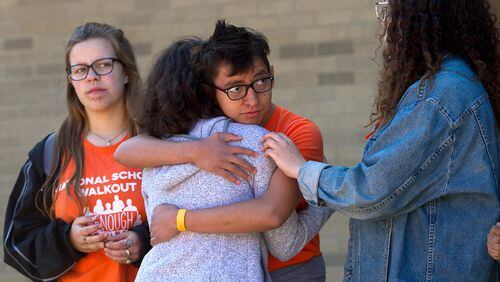A handful of schools across metro Atlanta participated in National Walkout events Friday, with activities and messages that varied in shape, scale and focus, on topics from gun control to police brutality.
The events were held Friday to coincide with the 19th anniversary of the Columbine massacre, when two students opened fire inside their Littleton, Colo., high school, killing 13 before killing themselves.
At Lakeside High School, students and elected officials heaped praise on the more than 500 students assembled for using their voices on issues that affect them. The work should not stop there, students were told.
Sally Harrell, a state senate candidate, recalled a rainy day several years ago when she was driving her daughter to Lakeside for class.
“She said, ‘Nobody looks out for teenagers,’ ” Harrell said. “I can’t get it out of my head. I knew she was right, and I knew I wanted to help fix it.”
Senior Sawyer Wolf took aim at the National Rifle Association: “Gun reform does not mean and has never meant eradicating the Second Amendment like the NRA wants you to fear,” she said. “The National Rifle Association received millions of dollars every year from gun manufacturing companies. Some of these gun manufacturing companies even donate a portion of every gun sale directly to the NRA. This means that the NRA makes money when people buy guns … The NRA represents the gun manufacturing companies. Their main goal is to protect the product, not our lives.”
Students evoked the names of Trayvon Martin, Michael Brown and Stephon Clark, young black men killed in recent years in incidents that have sparked conversations about a disproportionate number of black men killed by police.
“We as people of color have these actions normalized in our lives,” student Najah Alwakeel said to raucous applause. “Slavery and segregation are over, yet every day I hear a new news story about someone being hurt or killed for simply being black.”
Unlike the more than 100,000 students who participated in a March 14 walkout commemorating the one-month anniversary of the Parkland, Fla., shootings, school districts saw significantly less involvement Friday.
The gun-control theme doesn’t fire up all students in Georgia, where more than 600,000 people of all ages buy hunting licenses yearly and pro-gun groups have friends from farm fields to the state Capitol. Some students had refused to take part in the March 14 walkouts. Jacqueline Flash, 17, a North Atlanta High senior, said then that while she never wants school shootings to happen, schools “shouldn’t be sponsoring one half of the conversation” in the gun debate.
Friday at Tucker High School, students assembled on the school’s track before marching to the front of the school. Students carried signs with subtle messages — “We are the voices in the silence” and “Thoughts and prayers are not bulletproof” among them.
“No more silence … and gun violence,” they chanted as passing cars blew their horns in solidarity with the more than 300 assembled.
Victoria Smash, a 15-year-old freshman at the school, said she was disappointed that Friday’s march was preceded by news that a student was shot at a Florida school ahead of a protest there.
“It makes me mad to think that people were getting together to protest … and someone wanted to disrupt it,” she said.
Victoria Heika, 15, also a freshman at Tucker High, said she participated in her school’s demonstration because she no longer feels safe going to class, but student engagement across the country is showing how powerful speaking up can be.
“And even one voice can make an impact,” she said.
About three dozen students broke away from the group, taking off down Main Street with their signs held high, breaking rules set up as students and school administrators decided guidelines for their protests. District officials said students who caused a disruption would face repercussions.
At North Atlanta High School, about 300 students walked out onto the football field and held a 30-minute protest before returning to class, according to Atlanta Public Schools spokesman Seth Coleman. Two of those students left campus and went to the state Capitol for another protest. Another 25 Grady High School students left campus for the protest at the Capitol, Coleman said in an email.
APS did not specifically say if those students would be disciplined. Coleman referred to a statement that said the district supports students who walk out but demonstrations must be “pre-approved” by the safety and security office. APS officials had said Thursday that none of its schools were planning major outdoor demonstrations.
At Fulton County Schools, the number appeared to be fewer than 100, as opposed to 26,000 last month. District spokeswoman Donna Lowry said 10 young women walked out at Cambridge High School with no disruption to classes.
About 50 students from Chattahoochee High School’s Never Again Club walked to the school flagpole to commemorate Columbine’s anniversary, then went back to class. At Roswell High School, seven students walked to the stadium for a 13-second silent protest, then walked back to the school.
Cobb County School District spokesman John Stafford said no principals reported any student demonstrations or walkouts. After the March 14 walkout, Cobb schools disciplined students more harshly than some other metro Atlanta districts. Students who walked out of Cobb schools during last month's protest received one day of in-school suspension.
Gwinnett schools reported no student walkouts Friday.
Clayton County Public Schools spokesman Ronald Shields said via email he did not know how many of the district’s students participated in events. He added that students were previously “encouraged” to participate in events before or after school so as to not disrupt ongoing Georgia Milestones testing.
The story so far
The event that ignited the student movement happened February 14, when a former student walked into Marjory Stoneman Douglas High School in Parkland, Fla. and shot and killed 17 people and wounded 17 others.
Next
Students from the Florida high school began a national movement, which culminated in walkouts from schools on March 14. Many schools in metro Atlanta had protests. Then the Florida students helped organize marches March 24 in many of the nation's largest cities to call for stricter gun-control laws. Police estimate the crowd in Atlanta was 30,000.
Today
On the 19th anniversary of the Columbine High School shooting, a symbolic point in time for those agitating for changes and school safety, fewer students walked out of classes across the nation. Only a few walkouts were reported in metro Atlanta. Students at some schools here were allowed to participate in school-sponsored events, while others pledged to memorialize the day by volunteering or taking other action.
About the Author







